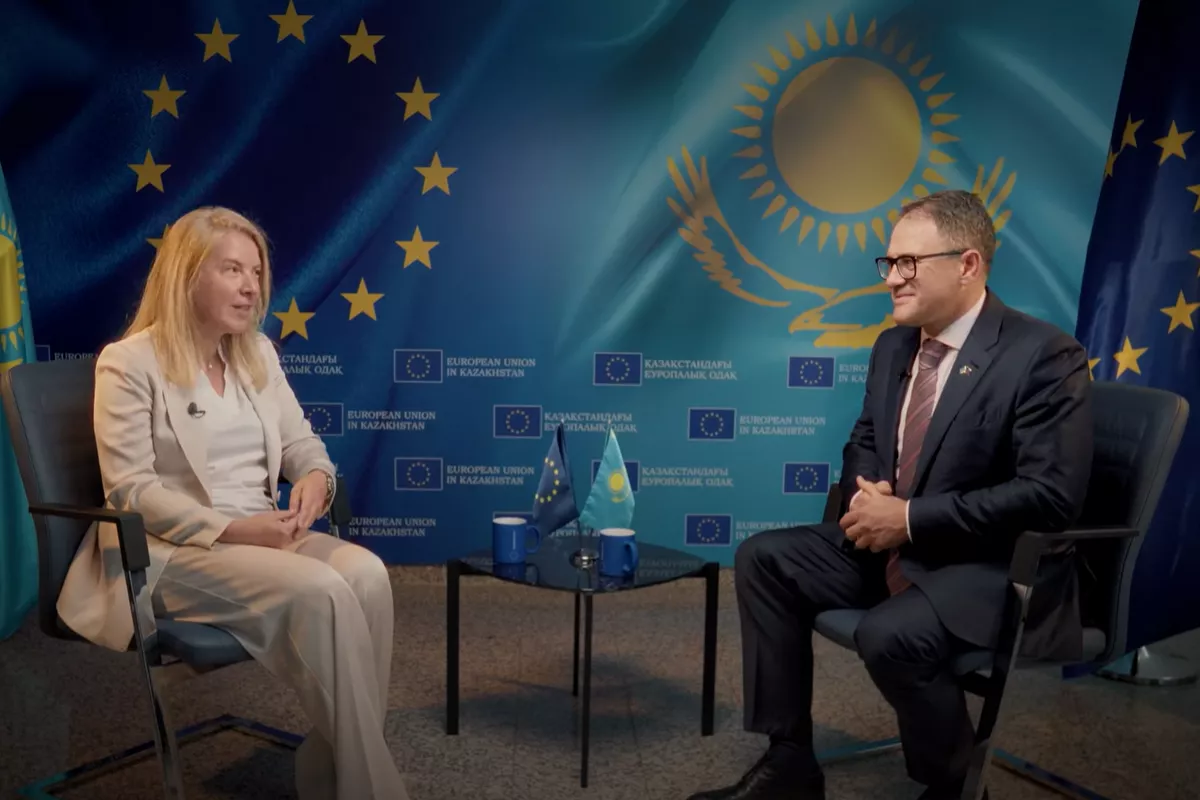
EU Ambassador to Kazakhstan, Aleška Simkić (left) with Kazakhstan’s Ambassador to the EU and NATO, Roman Vassilenko (right); Image: EU Delegation to Kazakhstan.
In a recent podcast discussion, EU Ambassador to Kazakhstan Aleška Simkić and Kazakhstan’s Ambassador to the EU and NATO, Roman Vassilenko, explored the evolving relationship between the European Union and Kazakhstan, as well as broader Central Asia.
Their conversation provided insights into the shared strategic interests that drive EU-Kazakhstan cooperation, covering key areas such as trade, energy, critical raw materials, connectivity, and mobility, The Caspian Post reports citing foreign media.
Trade and Investment: A Stable Foundation
Trade and investment continue to underpin the relationship; the European Union remains Kazakhstan’s largest trading partner and top foreign investor. Bilateral trade reached $49.7 billion in 2024, with the majority comprising energy exports from Kazakhstan, highlighting its role as a key supplier to European markets. The EU collectively accounts for a significant share of Kazakhstan’s FDI, equal to €54.8 billion in 2022, representing approximately 50-55% of Kazakhstan’s total FDI.
The Enhanced Partnership and Cooperation Agreement (EPCA), in effect since 2020, underpins the EU-Kazakhstan bilateral relationship, providing a legal framework for cooperation across 29 sectors. As noted by both ambassadors, it enables structured dialogue on trade, energy, governance, and sustainability. While political engagement has increased, both sides acknowledge that deeper implementation is needed to fully leverage the EPCA in line with the EU’s broader strategy for Central Asia.
Roman Vassilenko acknowledged the recent momentum: “I think the relationship between Kazakhstan and the EU has strengthened tremendously over the past three and a half years. With a relatively new Commission in place in Brussels, and with the President of Kazakhstan committed to strengthening ties with the European Union as part of our balanced and pragmatic foreign policy, we are at a moment where we can truly advance, deepen, and strengthen our relations in many ways.”
Energy and Raw Materials: Strategic Realignment
While energy has long anchored EU-Kazakhstan ties, both ambassadors emphasized a shift toward broader, forward-looking cooperation. Ambassador Vassilenko identified critical raw materials and green hydrogen as emerging areas of strategic importance, offering Kazakhstan opportunities to diversify its economy while supporting the EU’s green transition.
Kazakhstan, with its mineral wealth and renewable energy potential, is well-positioned to contribute to Europe’s supply chain resilience in clean technologies. The country’s abundant reserves of critical minerals-such as rare earths, copper, lithium, and cobalt-align with Europe’s need to diversify sources for its green transition. Coupled with growing investment in renewable energy and deepening cooperation with European partners, Kazakhstan stands out as a strategic supplier for clean-tech industries.
Both envoys stressed the importance of moving from basic resource exports toward long-term industrial partnerships - including local processing, infrastructure development, and regulatory alignment - as a means of ensuring mutual benefit.
Connectivity: The Middle Corridor and Infrastructure Links
Connectivity also features prominently. The Trans-Caspian International Transport Route, or “Middle Corridor,” is increasingly viewed as a viable overland route connecting China to Europe via Kazakhstan. Cargo volumes have risen, and both the EU and regional stakeholders are investing in capacity upgrades. The EU’s Global Gateway strategy includes a €12 billion commitment to infrastructure in Central Asia, covering transport, energy, and digital initiatives.
Connectivity was identified by both ambassadors as a strategic priority, with Vassilenko emphasizing the growing importance of the Middle Corridor and describing it as a key area for advancing regional integration and EU-Kazakhstan cooperation. Indeed, the EU-Kazakhstan collaboration now includes a dedicated Coordination Platform for the corridor’s development, aimed at strengthening transport links and infrastructure across the region.
As the ambassadors stressed, connectivity is not just logistical - it’s geopolitical. The Middle Corridor is becoming a central pillar of Kazakhstan’s role as a bridge between Asia and Europe.
Mobility: Negotiating Easier Access
Mobility remains a point of interest, particularly in light of Kazakhstan’s interest in visa facilitation with the EU. Negotiations are expected to begin in the fall of 2025 though outcomes will depend on alignment with EU visa policies and migration standards. Both ambassadors described greater people-to-people contact as a long-term investment in bilateral relations.
Strategic Context and Outlook
The EU’s broader engagement with Central Asia has gained urgency amid geopolitical tensions and supply chain disruptions. At the inaugural EU-Central Asia Summit in Samarkand in April 2025, leaders adopted the Samarkand Declaration, elevating relations to a strategic partnership and reaffirming respect for sovereignty and territorial integrity. The EU reaffirmed its “commitment to deeper cooperation in an evolving global and regional geopolitical landscape [and] upgrade relations between the European Union and Central Asia to a strategic partnership.”
As EU Ambassador Aleška Simkić noted in the recent dialogue: “We must continue to engage with geopolitics constructively. Both the EU and Kazakhstan share a commitment to the UN Charter and a peace-oriented agenda. I also see potential in regional integration. While the EU has its internal challenges, Central Asia is moving closer together. Kazakhstan plays a key role in that. Continued progress in regional cooperation offers significant opportunities.”
However, challenges remain. EU investment, while increasing, is still competing with a substantial Chinese and Russian economic presence. Additionally, practical barriers - ranging from infrastructure bottlenecks to regulatory fragmentation - could slow progress.
Nonetheless, there is cautious optimism. As the EU seeks to diversify its supply chains and develop more resilient partnerships, Kazakhstan has positioned itself as a relevant player. Whether that translates into durable, balanced cooperation will depend on sustained policy alignment, transparency, and mutual accountability.
Share on social media